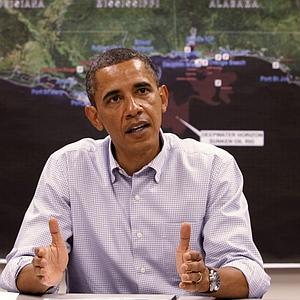Obama's 9/11 Envy
By John Podhoretz
NYPost.com
President Obama doesn't like the fact that the Gulf oil spill reminds people of Hurricane Katrina, since the public response to that catastrophe hastened the decline of his predecessor's standing. He'd prefer that the American people be reminded of something else -- something that rallied people around their president.
And so he told Politico over the weekend that the oil spill has "echoes of 9/11."
Americans thought differently about "our vulnerabilities" after the events of 9/11, Obama said, and the oil spill is "going to shape how we think about the environment and energy for many years to come."

This is, not to put too fine a point on it, one of the most bizarre things ever said by any president.
It is worth considering the meaning of this profoundly wrongheaded analogy tonight when the president delivers his first Oval Office address -- his latest attempt to minimize the political damage the oil spill is wreaking on his reputation.
The first thing that needs to be said is this: The only thing the oil spill and 9/11 have in common is nothing.
Yes, 9/11 was very important and so is the spill. But many terrible things happen, are important -- and are unalike. The Haiti earthquake of 2009 and Saddam Hussein's invasion of Kuwait in 1990 were both important, but they had nothing whatever to do with each other. Nor did the tsunami of 2004 and the Japanese raid on Pearl Harbor in 1941.
Just as in those cases, what's most notable about 9/11 and the oil spill is how essentially dif ferent they are. One was a brilliantly conceived and diabolical act of war; the other a horrific accident that was the last thing anybody wanted to happen. One was designed to decapitate the US government and deliver a mortal blow to the world's financial system; the other wasn't designed at all.
One was purposeful destruction intended to harm. The other is a purposeless catastrophe that was in no way intentional at all but will do great harm. One was an attack on the United States. The other was an accident.
So what on earth could the president have been thinking?
The first possibility is that there is some kind of perverse wish being expressed in these words. They have a wistful quality, as though the president wished he had a different crisis, a more popular crisis, on his hands.
Of course the fact that 9/11 would prove to be a net political benefit for George W. Bush was not the result of happenstance. It was due to the way he responded.
After a few days of discomfiting uncertainty, Bush found his voice and his purpose, delivering a series of powerful speeches that suggested a seriousness of purpose in regard to his presidential responsibilities that no one had actually expected of him.
Whatever happened afterward to shake that perspective on him in the minds of so many, the fact was that Bush had to meet the moment to secure the political advantage.
Obama has had no such moment in relation to the oil spill, because he couldn't have. BP didn't mean to do it and has been laboring desperately to fix what got broken. It is liable for what it did, it does not deny its own culpability, and it may itself be capsized as a result.
What the deployment of the 9/11 analogy suggests is that Obama would like to treat BP as though it were al Qaeda, at least rhetorically -- a villain for him to confront on behalf of the wounded American people.
That may seem politically shrewd to Obama and his team, but it will have parlous consequences. The analogy muddies and obfuscates.
By comparing an unwanted disaster to a conscious act of war, Obama is adding an improper moral dimension to the effort to clean up the Gulf -- a moral reckoning that will make it harder rather than easier to focus on the task of actually plugging the damn hole.
By likening the murder of 3,000 people and the efforts to take out the US government to a series of mistakes that added up to a catastrophe, Obama has defined evil down in a fashion that does immense violence to good sense, good taste and good leadership.
John Podhoretz is the editor of Commentary Magazine.